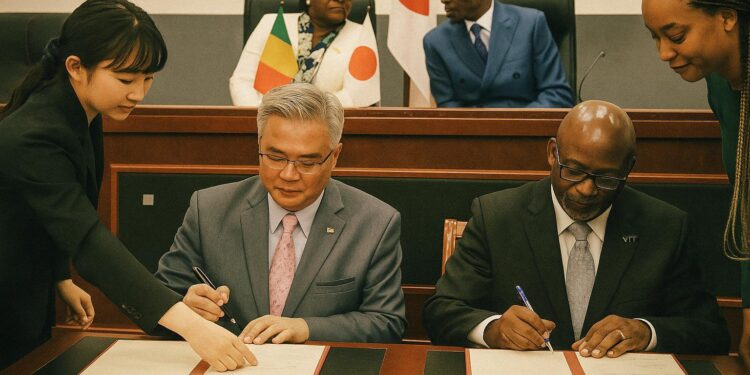Strategic Food Diplomacy Takes the Stage
When Chargé d’Affaires Maekawa Hidenobu and World Food Programme Representative Gon Myers initialled their partnership document in Brazzaville on 28 July, observers discerned more than a routine act of generosity. The consignment of 976 tonnes of rice and 71 tonnes of canned fish, valued at roughly 1.14 billion CFA francs, is the latest iteration of a quiet yet methodical Japanese outreach in the Congo Basin (WFP 2023). In Tokyo’s calculus, food security is increasingly deployed as a currency of influence that resonates both with Sustainable Development Goal 2 and with the long-standing concept of human security promoted by Japan since the 1990s.
Nutrition as a Pillar of Human Capital
For Brazzaville, the donation converges neatly with President Denis Sassou Nguesso’s 2022–2026 National Development Plan, which treats school feeding as a lever for universal primary enrolment and rural retention. Approximately 18 000 pupils in Bouenza, Cuvette, Lékoumou, Likouala, Plateaux, Pool, Sangha and Brazzaville stand to receive a daily meal that, educational specialists argue, can raise attendance by ten percentage points and cognitive scores by up to 15 percent over three years (UNESCO Institute for Statistics 2022). Minister Jean Luc Mouthou therefore portrays the initiative not as an episodic windfall but as a “multiplier of human capital” designed to sustain the Republic’s demographic dividend.
Protecting Refugees, Stabilising the Sub-Region
The package also earmarks rations for nearly 16 000 Central African refugees clustered in Likouala, Cuvette and Pool. Since renewed violence in Bangui’s western corridor in late 2020, Congolese reception centres have registered a 12 percent uptick in arrivals, raising logistical pressures on local prefectures (UNHCR 2023). By underwriting three months of caloric coverage, Tokyo indirectly contributes to regional stability, limiting secondary displacement and dampening the propensity of vulnerable groups to resort to negative coping strategies that often spill across borders. Such support aligns with Congo-Brazzaville’s commitment to the Kampala Convention on Internally Displaced Persons, a treaty the government ratified in 2014 and has since operationalised through community-based protection schemes.
An Alignment of Values and Interests
Japan’s cumulative contribution of 14.3 million US dollars to WFP operations in Congo over the past five years mirrors a pattern discernible across sub-Saharan Africa: targeted, high-visibility grants that marry humanitarian intent with reputational dividends. Analysts at the Tokyo Foundation for Policy Research describe the approach as a ‘values-based realism’, an ethos that allows Japan to underscore shared principles—equity, dignity, self-reliance—while subtly counterbalancing the infrastructural overtures of other external actors in Central Africa (Tokyo Foundation 2023). For Brazzaville, the calculus is equally pragmatic. The authorities view diversified partnerships as insurance against commodity-price volatility, and food-sector cooperation complements joint ventures already active in health, agriculture and vocational training.
Implementation Hurdles and Prospects
The logistical itinerary from Pointe-Noire to inland districts, some of which remain seasonally cut off, demands meticulous coordination among the Ministries of Social Affairs, Education and Transport. Previous WFP post-distribution monitoring noted a five-percent spoilage rate for perishable commodities along the Oubangui River corridor (WFP Monitoring Report 2021), prompting reinforced warehouse management and cold-chain protocols. The current consignment, predominantly composed of shelf-stable items, mitigates those risks, yet fuel shortages and riverine siltation remain potential bottlenecks. Government planners are therefore exploring public-private partnerships with Congolese logistics firms to ensure last-mile delivery, a model inspired by Ghana’s successful community-based warehousing programme.
Cementing a Partnership Beyond Calories
Beyond its immediate nutritional dividend, the rice-and-fish programme embodies an evolving diplomatic choreography between Brazzaville and Tokyo that accords agency to both sides. By signalling accountability in the use of external resources and by foregrounding human security, Congo-Brazzaville reinforces its image as a constructive regional actor. For Japan, every school meal served under WFP’s banner is a micro-endorsement of its worldview: that prosperity is sustainable only when the most vulnerable are nourished, educated and integrated. The shared message, articulated poignantly by Maekawa Hidenobu, is that no learner should have to arbitrate between the classroom and the dining table. In a global moment marked by supply-chain fragility and escalating climatic shocks, such calibrated gestures of solidarity acquire disproportionate strategic weight.












































